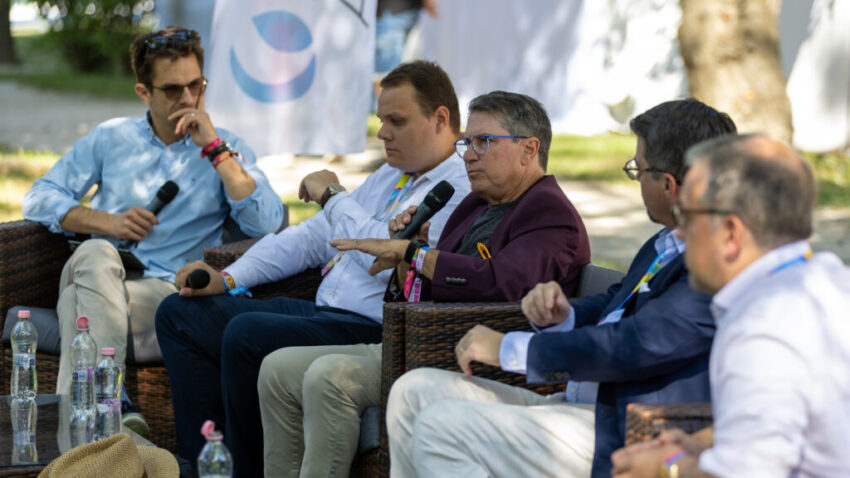Are we living in a post-liberal political order? This was the question that panellists were seeking the answers to at the discussion powered by the Danube Institute at MCC Feszt 2025 in Esztergom, Hungary. The featured panellists were Executive Director at the Danube Institute István Kiss; Patrick Deneen, professor of political science at the University of Notre Dame; Chad Pecknold, professor of theology at The Catholic University of America; and President of the Hungarian Institute of International Affairs Gladden Pappin. The discussion was moderated by Head of Operations at the Danube Institute Gergely Dobozi, the former editor-in-chief of this very website.
Mr Pappin kicked off the talks, stating that the term ‘post-liberalism’ suggests a new political foundation is necessary in this new age. Liberalism, he explained, is a political system based on individual rights, which has been tilting towards a ‘radical assertion of freedom and autonomy’. He also noted that liberalism originally emerged in a Christian context, which gave it ‘rails’. However, those rails have recently disappeared, leaving only radicalism, which now seeks to erase crucial links between the economy and the nation, and between politics and religion.
Mr Pappin also spoke of the so-called ‘black legend’—an idea propagated by liberals that claims individual freedoms exist only under liberalism, and that without it, only tyranny can prevail.
Professor Pecknold has told the audience that liberal advocates are trying to give a negative connotation to the term ‘post-liberalism’, for obvious reasons. However, they cannot really effectively do so, since, as the speaker explained, it is more of a descriptive term than a prescriptive one. By that, he means that ‘liberalism has collapsed under its own weight,’ as he put it, adding that ‘it has fragmented families and pulled us away from God.’
‘Mr Pappin also spoke of the so-called “black legend”—an idea propagated by liberals that claims individual freedoms exist only under liberalism’
Professor Deneen stated that the fundamental problem with liberalism is that, at its core, it assumes ‘a world with no preferences’—a concept that works in theory, but not in practice. Its commitment to ‘radical, autonomous, individual freedom’ has also led ideologues to cast suspicion on anyone with a contrarian viewpoint. As a result, those who once championed peaceful coexistence and free thought began to treat dissenters as ‘heretics’, the professor observed. He also opined that liberalism has, over the years, become a sort of ‘false religion’.
Mr Kiss pointed out that the liberal world order is actually an outlier in world history, as it only lasted about 50–60 years; and it only worked because it served the unipower United States’ interest at the time. Now that it no longer does so, even the US has started to pull back on promoting liberalism on the global stage, the speaker said. He also believes that liberalism is ‘digging its own grave’ as it is ‘disregarding its own values that made it possible in the first place.’
Mr Dobozi then asked the panellists for their thoughts on concepts such as freedom of speech, freedom of religion, and equality between the sexes being typically considered liberal values.
Professor Pecknold answered that these are not real liberal values, as liberalism embraces ‘radical autonomy’ which results in a ‘choose your own adventure from hell’. The Christian idea of freedom, on the other hand, advocates for duties to come along with freedoms, thus it embraces things like raising a child or serving your nation, he stated. The professor also shared his belief that the fact that liberalism has grown into a pseudo-religion proves that human beings are intrinsically religious.
Mr Pappin took back the word next, and reminded all that Prime Minister Viktor Orbán of Hungary talked about the idea of ‘illiberal democracy’ at the Tusványos free university festival back in 2014. He was vilified for that in the West, as he went against the aforementioned ‘black legend’ idea of liberalism, he pointed out.
On the topic of Hungary, Professor Pecknold has agreed with Mr Kiss’ thesis that the country’s national government has been essential in building a bulwark against the liberal world order; and has shown that it is worth investing in family support and border protection. The professor has even opined that Hungary’s family policy has influenced conservatives in the US to get away from their free-market approach to the issue of family and encouraging child-bearing.
Related articles:
The post Post-Liberalism Discussed at Danube Panel at MCC Feszt appeared first on Hungarian Conservative.
Click this link for the original source of this article.
Author: Márton Losonczi
This content is courtesy of, and owned and copyrighted by, https://www.hungarianconservative.com and its author. This content is made available by use of the public RSS feed offered by the host site and is used for educational purposes only. If you are the author or represent the host site and would like this content removed now and in the future, please contact USSANews.com using the email address in the Contact page found in the website menu.





